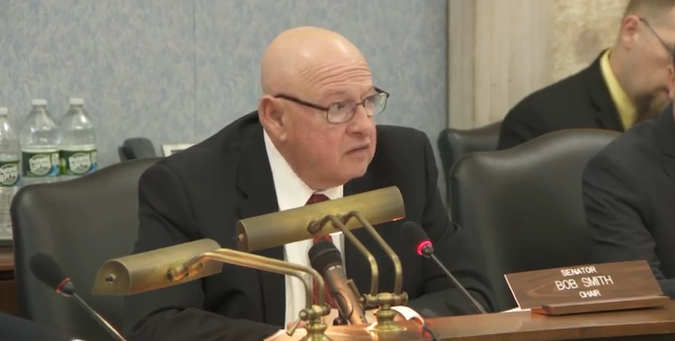Special Committee on Economic Growth Issues Report with Recommended Reforms & Improvements

Includes Strategies for Greater Transparency & Oversight, Actions to Improve Effectiveness of Tax Incentive Programs
Trenton – The special Senate committee created to evaluate the state’s economic development programs issued its report today with a broad array of proposed reforms to bring greater transparency and oversight to the Economic Development Authority, and to improve the effectiveness of the policies used to create jobs, attract investments to distressed communities and generate long-term economic growth in New Jersey.
The bipartisan Senate Select Committee on Economic Growth Strategies’ report follows eight months of work, which included a comprehensive review of past programs and four public hearings that focused on the best practices for economic expansion, said Senator Bob Smith, the committee’s chairman, and Senator Joe Pennacchio, the panel’s vice chairman.
“We took a hard look at the programs in place to determine the reforms needed to make them work with more transparency and accountability,” said Senator Smith. “We reviewed past practices with a critical eye so that we can develop constructive strategies for economic growth. This report provides a blueprint for reform and improvement to maximize New Jersey’s ability to compete for jobs and economic growth, with an emphasis on expanding opportunities in distressed communities.”
The reforms include the creation of an independent inspector general to oversee the EDA, a chief compliance officer within the authority, the annual recertification of awards with additional penalties for violations, and the Senate’s advice and consent on the appointment of top EDA officials.
“I would like to commend Chairman Smith for ensuring the Select Committee’s review of New Jersey’s tax incentive programs was accomplished in a fair and bipartisan manner,” said Senator Pennacchio. “The report includes significant input from Senate Republicans that reflect many of the priorities we laid out at the beginning of the process. Given New Jersey’s challenging business environment, we believe the final report represents a thoughtful strategy to make the Garden State more competitive, create new opportunities for residents, and better protect taxpayer dollars.”
The recommendations include a strict cap on individual awards, but no annual limit on the total program; an increase in the “net benefit” standard to require a greater return on investment, and a revision to the “but for” test that invites companies to pursue plans to relocate to other states.
It also calls for job training, support for affordable housing, a residential tax credit, a program targeted for small and mid-sized businesses, and community benefit agreements.
The committee gathered input from state and regional leaders in the business community, academics specializing in economic development, and qualified experts to identify a strategic approach to maximize private investment and job growth, especially for distressed communities. The panel also sought a true accounting of the costs and the return on investments, including total capital investments by those participating in the programs.
In response to the report, Darryl Isherwood issued a response on behalf of the governor's office.
"We’re gratified that the committee has recognized issues first raised by the governor in the early days of his campaign. However, we believe these recommendations do not go far enough," Isherwood said. "Nearly 18 months ago, Gov. Murphy introduced a tax incentive plan to replace the program that expired in June. That plan incorporates accepted best practices including an annual cap on awards, and we continue to believe that cap is integral to the program. In fact, even the nationally recognized experts that testified before the Senate committee recommended an annual cap on any incentive package. While most of these recommendations are incorporated into the governor’s plan and others already are part of the EDA process, we look forward to discussing them with the legislature as part of our continued talks. Now that both the committee and the governor’s task force have weighed in with recommendations, we expect there will be no more delays from the legislature on passing a new incentives package."
The 25 recommendations are:
Reforms to Enhance Transparency, Accountability, and Oversight
- Create Economic Development Authority Chief Compliance Officer Position
- Establish an Office of the Economic Development Inspector General
- Make Each Project’s Net Benefit Analysis Publicly Available
- Make Explicit that the Attorney General Can Prosecute Companies for Falsifying Information
- Annual Recertification of Awards
- Data Sharing Agreements
- Advice and Consent by the Senate for Top Appointments
- Biennial Program Evaluations
Recommendations to Improve Effectiveness & Efficiency of Programs
- Reduce Generosity of Key Incentive Programs
- Require Community Benefit Agreements
- Increase of the Required Net Benefit
- Impose a Strict Cap on Individual Awards, But No Annual Program Cap
- Provide Enhanced Benefit to Selected Cities in Need of Private and Public Investment
- Encourage Development in Population Centers and Business Districts Including Those in Suburban Areas
- Include a Residential Tax Credit Program to Facilitate Urban Revitalization
- Reduce Reliance on “But For” Test
- Incentivize Private Investment in Infrastructure
- Allow Upward and Downward Adjustment in Award Amounts
- Structure Incentives to Target High Growth Potential, High Tech, and Environmentally Beneficial Industries
- Simplify the Application Process for Small and Start-up Businesses
- Incorporate Workforce Training and Educational Partnership Requirements
- Develop Agreements Based on Entirety of a Business’s Operations
- Require PILOT Agreements to be Incorporated into Incentive Agreements
- Provide Housing Tax Credits towards Affordable Housing Projects
- Create a Business Expansion Program for Small and Mid-Sized Businesses
The panel’s other members are: Senator Nilsa Cruz-Perez; Senator Dawn Addiego; Senator Joseph Lagana, and Senator Declan J. O’Scanlon.





